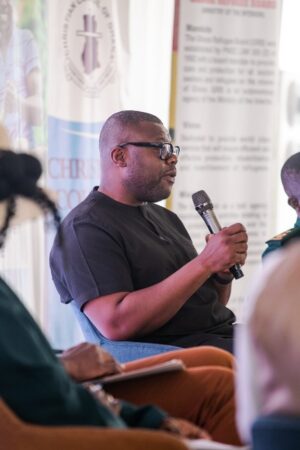By Christabel DANSO ABEAM
Identification cards for eligible refugees will be introduced within weeks, providing documented status that could unlock access to financial services and formal employment for thousands of displaced persons, Tetteh Padi, Chief Executive Officer of the Ghana Refugee Board (GRB) has disclosed.
He added that his outfit is working with the National Identification Authority (NIA) to issue five-year non-citizen identification cards to refugees who have completed official recognition processes.
The initiative addresses longstanding documentation barriers that have prevented refugees from accessing banking services and formal employment opportunities.
“The National Identification Authority law specifies that foreigners who are residents in the country for more than three months must be issued with a non-citizen identity card,” Mr. Padi explained during the 2025 Refugee Economic Summit in Accra.
The summit, themed: ‘Leveraging community as a superpower to build sustainable livelihood opportunities for refugee youth’, brought together government agencies, international organisations, and private sector partners to address refugee economic integration.

Mr. Padi indicated that registration would begin following resolution of administrative challenges through meetings between GRB, the UN Refugee Agency (UNHCR), and NIA. Only officially recognised refugees will qualify for the documentation.
The identification cards are expected to facilitate refugee access to financial credit, social services, and economic opportunities. Current documentation gaps have limited refugees’ ability to open bank accounts, secure formal employment, or access government services available to documented residents.
Francis Ayebie, Service Chief Superintendent of the Ghana Immigration Service (GIS) confirmed the institution’s commitment to streamlining legal document access for eligible refugees. “The GIS has maintained close partnership with the GRB to ensure refugees can access necessary documents for accommodation in Ghana,” he said.
However, employment challenges persist despite documentation improvements. The GRB has partnered with private institutions to recommend refugees for available positions, but companies often prefer hiring citizens over refugees, according to Mr. Padi. To address employment discrimination, the GRB plans educational forums for employers to highlight refugees’ skills and dispel misconceptions about their economic contributions, Mr. Padi added.
Trust Ngulefac Tamonkla, a refugee resident in Ghana for six years, described difficulties accessing work permits and employment opportunities. He called on stakeholders to intensify efforts by improving refugee living conditions.
The intervention led by the GRB coincides with broader continental efforts to reframe refugee economic potential. Mercy Kusiwaa Frimpong of Amahoro Coalition, a participating organisation, said their organisation secured over 33,000 job pledges for refugees across Africa during the recent Africa Forum on Displacement held in Nairobi.
“We are proving that refugees are contributors not burdens. They are doctors, coders, agripreneurs, teachers, and technicians—people who fled conflict, not their skills,” Mrs. Frimpong said.
The identification card intervention forms part of the nation’s evolving refugee policy framework, which has historically focused on humanitarian assistance rather than economic integration. The country hosts refugees from 40 countries, with many residing in urban areas alongside rural refugee settlements.
Housing remains a significant challenge for newly arrived refugees. Mr. Ayebie called for government support in constructing temporary accommodation facilities to ease initial settlement difficulties before refugees establish independent livelihoods.
The summit was organised by multiple stakeholders including the Mastercard Foundation, UNHCR, Christian Council of Ghana, and World University Service of Canada, with support from Amahoro Coalition indicating broad institutional collaborations for refugee economic integration initiatives.










